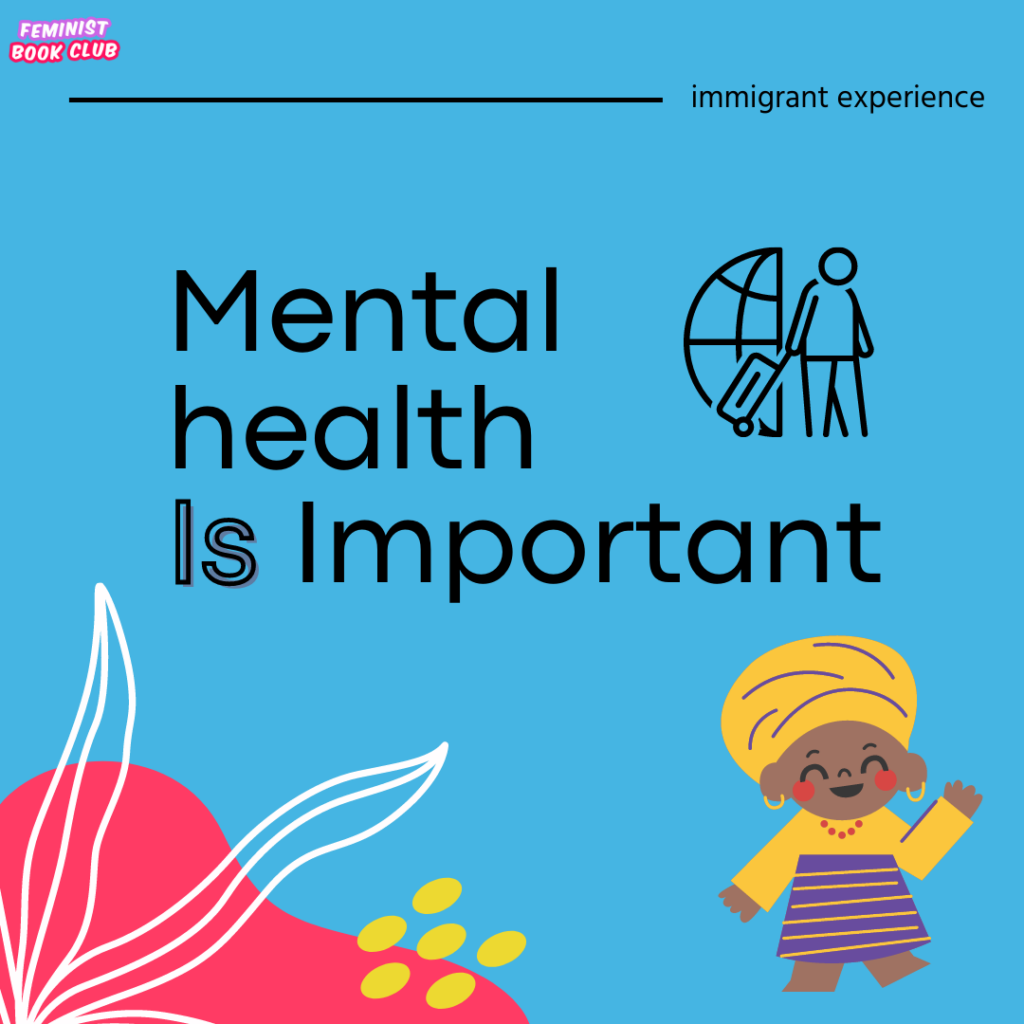This post may include affiliate links, which means we make a small commission on any sales. This commission helps Feminist Book Club pay our contributors, so thanks for supporting small, independent media!
Immigrant mental health is a broad term to describe the complex and unique interplay of cultural, social, economic, and environmental factors that impact immigrants.
For the first few years of my life, I lived as every other child would, unaware of the complex world of mental health. Growing up in an African household, within the confines of our cultural norms and traditions, mental health was not a topic that we openly discussed or acknowledged. A veil was drawn over this crucial aspect of well-being, and I never had to think about it.
I recently read Eduafe Okporo’s Asylum, a memoir that follows the personal journey of gay man escaping persecution in Nigeria. One moment that stuck with me was Eduafe’s experience with customs on his way into America. It took me back to my own experience, and the feeling of stress and anxiety that comes with the fear of the unknown and the possibility of deportation. I remember that first encounter as setting the stage for the immigrant experience, feelings of not belonging. This is the experience of many immigrants who make their way to western countries in search of opportunities and seemingly better lives.

Challenges
Unsurprisingly, immigrants often grapple with many challenges that can significantly impact mental well-being. The process of adaptation can be overwhelming, as we navigate through cultural differences, language barriers, and racial discrimination. We find ourselves caught between two worlds, torn between preserving our heritage and assimilating into a new culture. This internal conflict can generate a sense of isolation and a loss of identity, leading to anxiety and depression.
As an African immigrant, I understand the challenges and triumphs that come with starting afresh in a foreign land. I adapted quickly. At the same time, I dealt with feeling othered in a new environment. It can be easy to ignore mental health because there are other more pressing things to prioritize. But neglecting mental health has negative outcomes on one’s body and one’s ability to successfully navigate the world. While the pursuit of economic stability is often at the forefront of our minds, it is crucial to acknowledge the importance of mental health.
Stressors and Stigmas
Immigration brings with it a myriad of stressors. Financial burdens, familial expectations, and the pressure to succeed weigh heavily on our shoulders. The responsibility to provide for our families adds an extra layer of stress. Coupled with the fear of being seen as a burden or facing rejection, this can result in chronic stress and emotional exhaustion. Additionally, the lack of social support networks and limited access to healthcare resources exacerbates the challenges.
In the Yoruba community where I grew up, there is a stigma surrounding mental illness. Thus, there were few pathways to getting help. People were reluctant to speak about it for fear of seeming emotional and weak. This stigma limits many from talking about their personal health and seeking help.
Strategies for Mental Health Support
To ensure the well-being of immigrants, it is essential to implement strategies that promote mental health resilience.
- Community support systems: Creating spaces where immigrants can share their experiences, seek advice, and build connections helps to combat feelings of isolation. Establishing cultural centers, support groups, and mentorship programs can facilitate this process. In Asylum, Eduafe is hopeful because he’s able to build community, and that’s what I look to as an inspiration. I believe we owe it to ourselves to be open and supportive in order to help those in our community who feel isolated and are othered in any way.
- Culturally sensitive mental health services: Many immigrants come from cultures where mental health concerns are stigmatized or not taken seriously discussed. By offering accessible and culturally appropriate mental health resources, we can encourage individuals to seek help without fear of judgment. Collaborating with community leaders, and cultural organizations can bridge the gap between mental health professionals and the African immigrant community.
- Creating Awareness: Educating both immigrants and the host community about the challenges faced by immigrants is another crucial step. By raising awareness and promoting empathy, we can foster a more inclusive society that understands and supports the mental health needs of immigrants. Schools, workplaces, and community organizations can organize workshops, cultural exchange programs, and diversity training to promote understanding and reduce discrimination.
What I’ve Learned
Over time, I’ve learned that the best thing I can do is take a step for myself everyday. Years after migrating, I was deep into anxiety and depression. My upbringing has given me such a work ethic and a duty to my people that it had caged me and turned me into a barely functioning human. I didn’t have the words for it, and I found it hard to express the despair I was feeling. It wasn’t until I saw a counselor at my college that I was able to understand my unique experience and be armed with strategies to combat it. One of the best things I got from my counselor was an introduction to Brené Brown.
Brené Brown is a renowned psychologist whose insights have profoundly impacted my perspective on self-compassion and personal growth. Brené Brown’s work emphasizes that great work and personal development cannot be achieved when burdened by debilitating self-scrutiny and harsh self-judgment. Instead, true transformation occurs through embracing self-love and care. Her teachings have encouraged me to be more gentle with myself. I’ve started fostering a more nurturing relationship with my own emotions and vulnerabilities, ultimately empowering me to pursue a more fulfilling life.

When life becomes overwhelming, I take moments to disconnect. I have found that a retreat into nature can be incredibly beneficial for my mental health. During my walks, I often notice the lush greenness of the grass. This has become a meaningful metaphor for my own personal growth and well-being. I observe that grass gets watered by sprinklers and thrives. I have come to associate this process with my daily efforts towards self-improvement. Like nurturing the grass, I remind myself that tending to my mental health is a gradual process. Even the small steps matter. Just as I observe the grass gradually transforming and becoming more vibrant, I understand that my journey to better mental health involves continuous cultivation. In the past, I have overlooked the work that it takes to get to the green grass, just as I have disregarded my own well-being. But now, I’ve internalized the notion that self-care and self-compassion are crucial for personal growth and resilience. It’s okay to have days when I forget to “water” myself. The realization that I am still there, still trying to take care of myself, gives me a sense of empowerment . I know I have control over my journey to better mental health. Like the grass that persists through different seasons, I, too, can endure and flourish with consistent self-care and nurturing.
–Me!
What You can Do
- Notice the Little Things: Take time to observe your world. Having time to physically see, touch and feel the objects around you can be grounding.
- Practice Gratitude: Writing 5 things you’re grateful for. This is a way to shift your focus towards the positive aspects of life. It also helps to cultivate a sense of appreciation and contentment. This simple daily exercise can have a profound impact on your overall well-being and perspective.
- Self-Care: Engaging in activities that promote self-reflection, relaxation, and stress reduction can significantly improve mental health. This can include engaging in hobbies, exercise, meditation, or seeking therapy.


